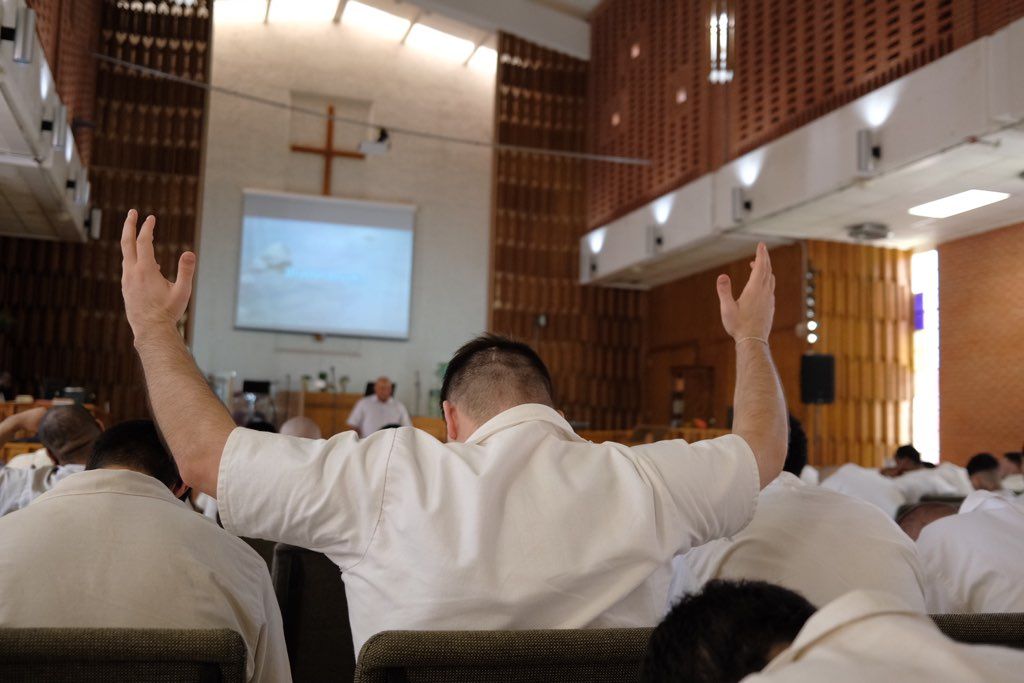Can a prison-based educational program change lives?
New research says education changes lives.
Can a prison-based theological education program prepare men and women for ministry leadership, increase the health and well-being of incarcerated individuals, improve prison culture, and assist in reentry and recidivism prevention? The purpose of this evaluation project is to provide an answer to this question.
The problem with incarceration
Approximately 2.2 million men and women are held in prisons and jails across the United States on any given day, and more than 95% of these men and women will eventually be released back to their communities: That’s more than 626,000 people who are released from state and federal prisons annually, and more than 11 million people cycle through local jails each year.
Recidivism is the tendency of a convicted criminal to repeat or reoffend after serving their sentence. In the U.S., nearly 44% of those released will return to prison before the first year out of prison, about 68% will be arrested for a new crime within three years, and 77% will be arrested within five years (World Population Review, 2022).
The solution to changing the lives of incarcerated individuals
A variety of educational programs are available in the United States prison system. Research has shown that both secular and faith-based educational programs in prisons can reduce recidivism rates and provide students with the skills necessary to reintegrate into society and with opportunities for career advancement (Courtney, 2019; Dewey et al., 2020; Esperian, 2010; Nally et al., 2012; Pompoco et al., 2017; Reese, 2019). Such programs are intended to “educate, empower and transform the lives of incarcerated individuals” (Reese, 2019, p. 687), and it appears that they do so effectively.
World Impact’s Prison Ministry program—The Urban Ministry Institute (TUMI)—is a faith-based correctional education program currently operating in 43 state and federal prisons in the United States. This evaluation is designed to assess the TUMI prison-based theological training program.
Prison research project
I interviewed 74 incarcerated men and women in jails and prisons throughout Kansas and Texas, 40 formerly incarcerated program graduates (some in California), and with the help of partners, we administered quantitative and qualitative surveys to 157 currently and formerly incarcerated participants across the U.S.
I asked participants to rate their experience with TUMI in areas that are shown in the research literature to promote successful re-entry:
- Well-being
- Program quality
- Program impact
Currently and formerly Incarcerated men and women were invited to discuss how participation in TUMI has impacted them in semi-structured group interviews and through surveys that contained both quantitative and qualitative questions.
Virtually all of the currently and formerly incarcerated TUMI participants with whom I spoke reported that participating in prison higher education had significant transformational effects on their lives, both inside and outside of prison, and on their communities.
Four key findings from our research
Results indicate that, far more than a seminary education, TUMI is equipping men and women for Christian leadership and service, it is creating psychological well-being, it is creating healthy thinking patterns, it is bringing self-awareness and self-respect to its participants, it is creating positive interpersonal relationships inside and outside prison walls, and it is equipping participants with problem-solving skills, impulse control, the ability to manage negative emotions, and freedom from substance use disorders.
1. Well-being
That TUMI participants evaluated themselves so highly in terms of well-being is remarkable. It is well known that the psychological well-being of prisoners is poorer than other groups, which puts them at risk of re-offending while in prison and as well as when they return to their community after serving their sentence. An emerging body of research demonstrates that prison rehabilitation programs that show the greatest potential for reducing recidivism are those that address mental health and well-being as well as providing some kind of education. Given that participants in this evaluation reported exceptionally high levels of well-being, especially given their circumstances, it appears that TUMI shows great promise for preparing prisoners to transition back to the community following release.
2. Healthy thinking patterns
Participants felt that the TUMI program empowered them to take on leadership roles and to serve as role-models in their communities inside prison and upon release. Another theme that emerged from the open-ended responses and interviews suggests that the TUMI program positively impacted the way they view themselves—it brought on a new kind of self-respect, a new identity. And many felt that TUMI empowered them as learners and built their confidence and academic self-efficacy well beyond their imaginations.
3. Interpersonal impact
TUMI participants reported different kinds of growth related to their interpersonal relationships, which they described as being a direct result of incarceration and participation in TUMI. They experienced newfound compassion for others, a sense of responsibility to act in ways that benefit society, a desire to establish positive relationships with others, an overwhelming desire to associate in positive ways with their community, and an intentional renunciation of gang affiliations and activities.
Participants described how they are more authentic in their relationships and feel a sense of responsibility to be better fathers, husbands, wives, partners, and community members than they were before TUMI. They have more social awareness, empathy, compassion, and healthy social interactions than ever before.
4. Healthy coping strategies
A theme that captured the experience of participants in this study was effective coping, which refers to one’s emotional management and self-regulation capabilities. Participants describe situations where they effectively and constructively managed negative emotions, tolerated stress, controlled their impulses, and solved problems of a personal and interpersonal nature in ways they had not been able before being a part of the TUMI program. A number of participants described increases in self-regulation, especially related to drug and alcohol intake.
Conclusions
Interview and survey results suggest that individuals who have participated in TUMI prison-based seminary training believe their education provided long-term improvements in outcomes for them, for their families, and for the correctional administration as a whole.
In summary, positive changes can occur during periods of incarceration, as evidenced by the qualitative and quantitative evidence gathered throughout this research project. The men and women I interviewed and surveyed undoubtedly sought out ways to redeem themselves and to achieve growth with extraordinary agency and motivation in what many would consider extremely arduous circumstances.
Positive growth in prison seems unattainable to most, but the men and women who participated in TUMI succeeded in achieving positive transformation in the context of imprisonment.
What I’ve learned over the past year is that TUMI is providing so much more than a seminary education. It is creating healthy thinking patterns, it is bringing self-awareness and self-respect to its participants, it is creating positive interpersonal relationships inside and outside prison walls, and it is equipping participants with problem-solving skills, impulse control, the ability to manage negative emotions, and freedom from substance use disorders.
The men and women who participated in TUMI have undergone tremendous transformation. Being a part of TUMI, according to the 74 currently incarcerated men and women and 40 formerly incarcerated program graduates, and the 157 survey respondents who were a part of this year-long impact evaluation, results in significant cognitive, intrapersonal, interpersonal, and emotional shifts.
In the words of one participant, “It’s changed what I’m living for!”
Ready to learn about how program evaluation can maximize your organization’s community impact? From data collection, to analysis, to communicating findings to a wide audience, we develop insights that drive informed decisions. Get started by emailing robin@labarberalearning.com.










